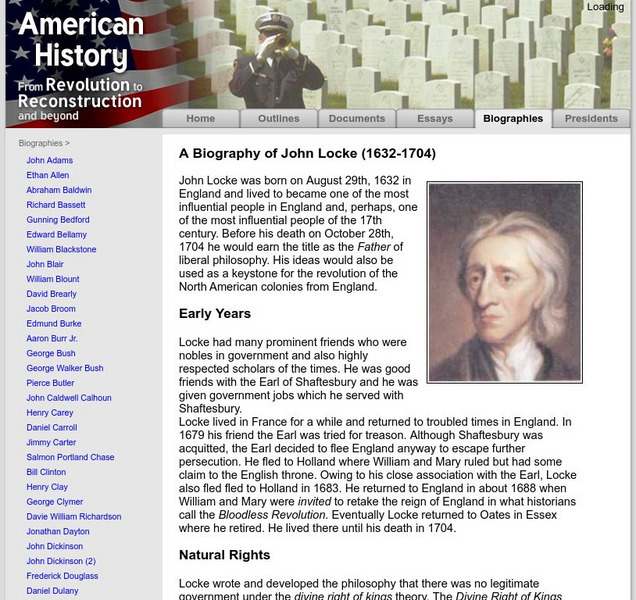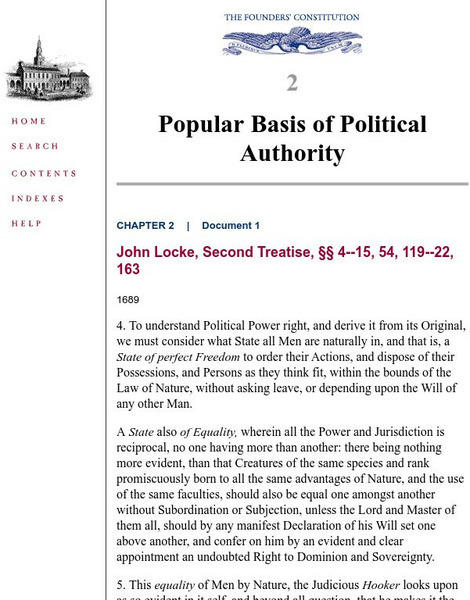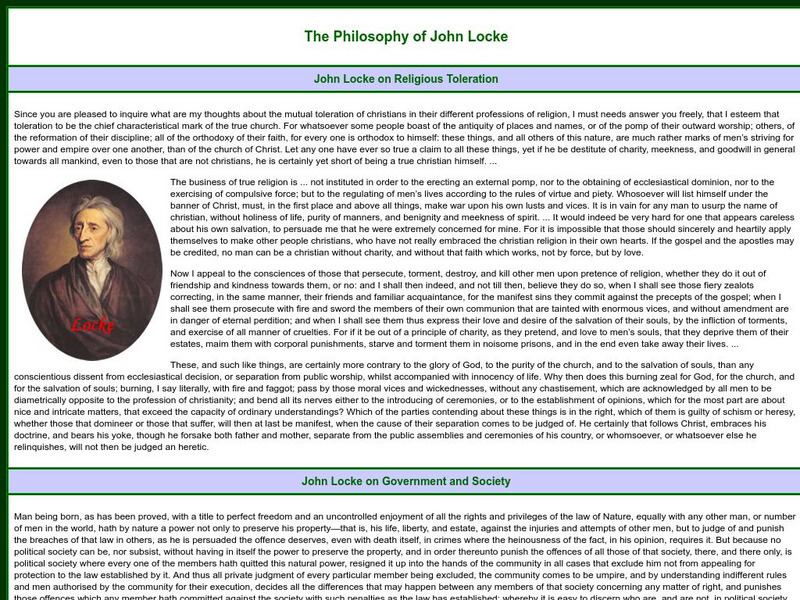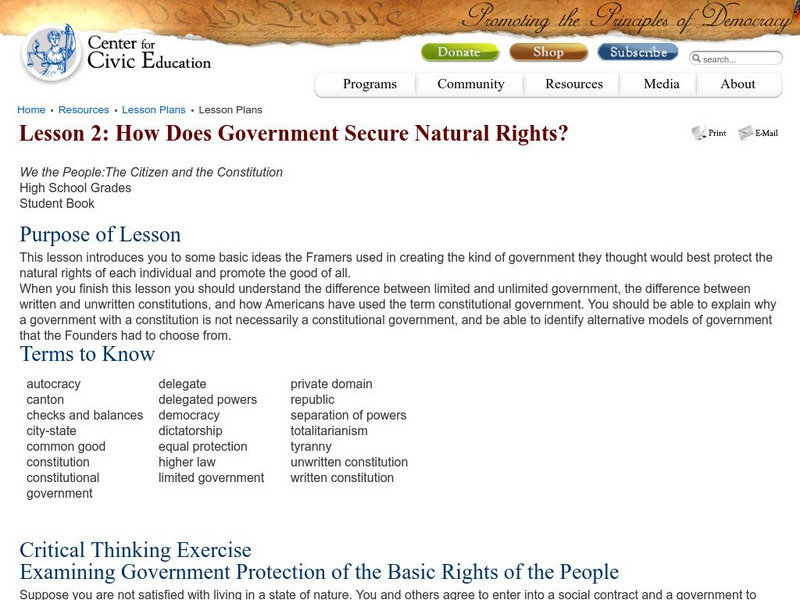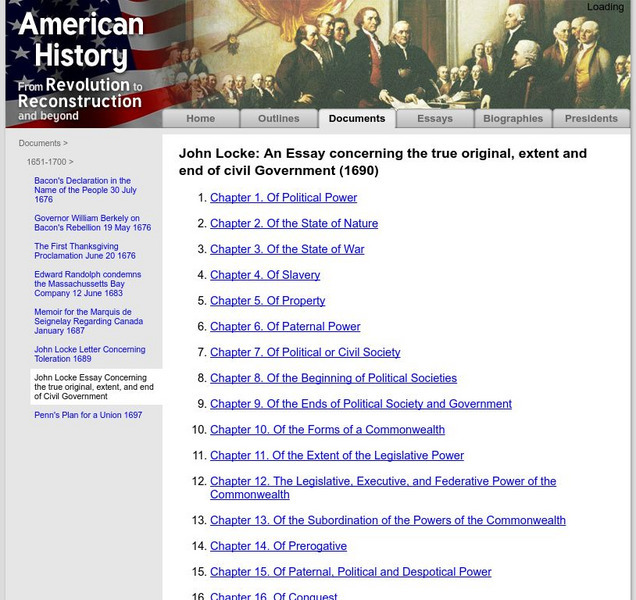Curated OER
How Does Government Secure Natural Rights?
Students explain why a government with a constitution is not necessarily a constitutional government, and identify alternative models of government that the Founders had to choose from.
Curated OER
How Man Negotiates Away His Natural Freedom
Young scholars recognize that our legal-political system has developed through a process of moving from philosophical ideals to compromised working models.
University of Groningen
American History: Biographies: John Locke
The University of Groningen provides information about the 17th century British liberal philosopher. Includes concise biographical information and a link to the text of "A Letter Concerning Toleration." Read about what part of his...
University of Chicago
U. Of Chicago/ Popular Basis of Political Authority
Excerpts from John Locke's famous 1689 work "Two Treatises of Government" where he discusses his political ideas that came to influence the U.S. Revolutionaries.
Henry J. Sage
Sage American History: The Philosophy of John Locke
Writings of philosopher John Locke on religious toleration, government and society from which students will gain an understanding of the underpinnings of American government.
Other
Modern Political Theory
This site contains a question and answer format on the theories of Locke and Hobbes. It answers questions about the political system and social contract, as well as theorizing about the state of nature and rights of man.
McMaster University
Mu: For Encouraging the Coining Silver Money in England
Notes on Locke's essay "For encouraging the coining Silver Money in England, and after for keeping it here."
McMaster University
Mu: Further Considerations Concerning Raising the Value of Money
View text of Locke's essay "Further Considerations Concerning Raising the Value of Money."
McMaster University
Mu: Consequences of Lowering Interest & Raising Value
View text of Locke's essay "Some Considerations of the Consequences of the Lowering of Interest and the Raising the Value of Money."
CPALMS
Florida State University Cpalms: Florida Students: Enlightenment Ideas and the Founding Fathers
A tutorial that looks at the ideas from the Enlightenment that influenced the Founding Fathers, particularly those of John Locke and Montesquieu. A PDF file of the tutorial is available.
Constitutional Rights Foundation
Constitutional Rights Foundation: Religious Rights in Conflict
What happens when rights conflict? Explore sample conflicts: Free press vs. fair trial, religious rights in conflict, and Singapore: model society or city of fear? Great learning activities and lesson plans for teachers and students.
Center For Civic Education
Center for Civic Education: How Does Government Secure Natural Rights?
This lesson introduces students to some basic ideas the Framers used in creating the kind of government they thought would best protect the natural rights of each individual and promote the good of all. At the end of the lesson, students...
Huntington Library
Huntington Library: A Nation Conceived in Liberty [Pdf]
In this instructional activity, 11th graders examine the events and political philosophy that laid the foundations of the American government, the Constitution, and the Bill of Rights. They also look at what role religion played in...
Internet Encyclopedia of Philosophy
Internet Encyclopedia of Philosophy: John Locke (1632 1704)
Extensive overview of the English philosopher covers his studies, particularly in medicine, and his published works. Includes a bibliography.
University of Groningen
American History: Documents: John Locke on Government
This site from the University of Groningen provides the complete John Locke's "Second Treatise on Government." It discusses everything from slavery and property to civil government and its functions.
Boston University
Boston University: The Social Contract Tradition
This site presents an abstract of the social contract tradition. It also contains a very detailed overview of the ideas of Hobbes, Locke, and Rousseau.
Digital History
Digital History: By What Right [Pdf]
Two opposing philosophies concerning the relationship between government and its citizens were expressed by Thomas Hobbes and John Locke in the 17th century. Compare these two philosophies and see how they were related to the colonists'...
Digital History
Digital History: Declaring Independence [Pdf]
Follow the steps that Americans took before declaring their independence from Britain. The Declaration of Independence set out the ideals and reasons behind this stunning move. Use the student exercises to understand the different levels...
Internet History Sourcebooks Project
Fordham University: Modern History Sourcebook: Two Treatisies on Government
This site provides selections from John Locke's "Two Treatisies on Government." It contains evaluations on the sections 'Of the State of Nature' and 'Of Political of Civil Society.'
Rice University
Galileo Project: John Locke
At this site from the Galileo Project of Rice University, you can view factual information about Locke's life. Written in lists; easy to read. Includes categories such as nationality, education, religion, scientific disciplines, and...
Victorian Web
Victorian Web: John Locke
A brief but informative biography is provided, about John Locke and his major works and accomplishments. There is a black and white portrait, along with links to additional information included.
Other
Liberty Online: Locke's Second Treatise on Government: Of Conquest
At this site you can read Chapter XVI, Of Conquest, by John Locke stating that the basis of any government must be the consent of the people, and implying in the writing that war or revolution is often mistaken as consent. (Published in...
University of North Carolina
American Self Government: The First & Second Continental Congress [Pdf]
Looks at the significant events and decisions of the First and Second Continental Congresses that piloted the movement towards self-government.
Bartleby
Bartleby.com: Two Treatises of Government
Presents an evaluation of John Locke's "Two Treatises on Government." Site explains how Locke refutes the doctrine of absolute power and attempts to reconcile the liberty of the citizen with the political order.




